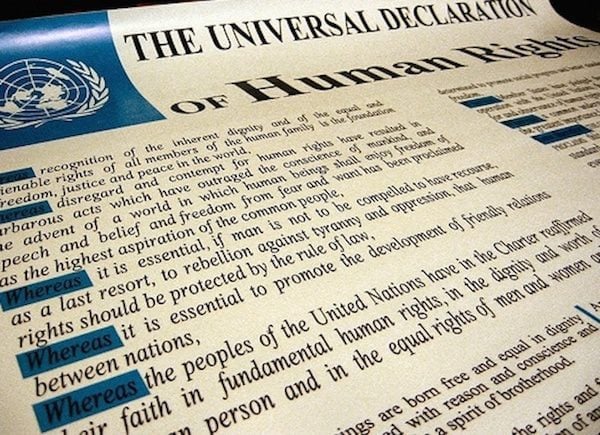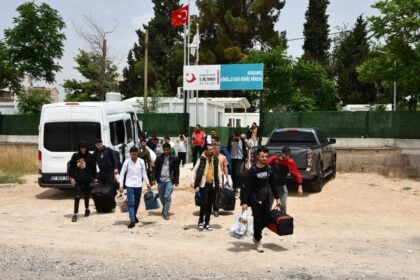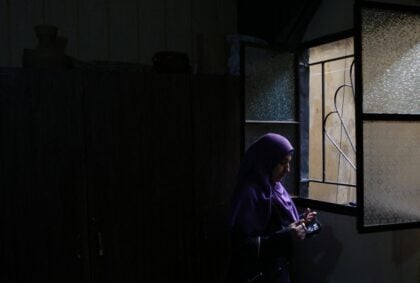
Introduction
The concept of human rights has become a well-known and widely accepted term to use. Varying interpretations are possible, with differences usually being based on cultural background. Nonetheless, most of these understandings consciously or subconsciously include the basic rights outlined in the United Nations’ Universal Declaration of Human Rights.
The United Nations General Assembly (GA) adopted the Universal Declaration of Human Rights on December 10th, 1948. It was written in the aftermath of World War II, “… as a common standard of achievement for all peoples and all nations, to the end that every individual and every organ of society, keeping this Declaration constantly in mind…” Thus it was truly meant to be universal, to protect citizens from any type of violation the world had recently experienced, as outlined in the Preamble and 30 Articles.
As such, it includes articles on the right to life in dignity; liberty and security; freedom of movement; right to nationality and education; just treatment of human beings and respect; as well as freedom of expressions and opinions, from torture or inhumane treatment, as well as economic, social and cultural rights.
International Human Rights Law
The Declaration is not legally binding, but is the basis of international human rights law. Two binding UN covenants were formed as a result of the UDHR; the International Covenant on Civil and Political Rights and the International Covenant on Economic, Social and Cultural Rights. Combined, these three documents are often referred to as the “International Bill of Human Rights”.
Over the years other conventions have been written to expand on and add to this fundament, focusing on a variety of topics such as refugees (1951 and 1967), discrimination of women (‘CEDAW’, 1979) and disabled persons (2008), against torture (1987), protection of migrant workers (1990), and against racial discrimination (1969) to name a few.
Additionally, the International Labour Organization has compiled a large number of conventions specifically related to work force and labour standards, of which 8 are considered ‘fundamental conventions’ and relate to freedom of association (1948, C087), collective bargaining (1949, C098), forced labour (1930, C029 and 1957, C105), minimum age (1973, C138), child labour (1999, C182), equal remuneration (1951, C100), equal opportunity and treatment (C111).
Geneva Conventions
The Geneva Conventions are a revision of previously constructed conventions, adjusted after WWII and specifically focus on treatment of persons in time of war. It consists of four Conventions, and three additional protocols. The International Committee of the Red Cross (ICRC) explains that the Conventions “aims at ensuring that, even in the midst of hostilities, the dignity of the human person, universally acknowledged in principle, shall be respected.”
During a series of expert meetings, congregations by Red Cross agencies, and a confluence of government representatives over time, the articles were revised until a draft was represented at The Diplomatic Conference for the Establishment of International Conventions for the Protection of Victims of War in 1949. The Final Act was signed by fifty-nine nations, some of which no longer exist, and has attained more signatories since.
The Cairo Declaration on Human Rights in Islam (CDHRI) was compiled by the Organisation of Islamic Cooperation (OIC) in 1990, during the 19th Islamic Conference of Foreign Ministers in Cairo, and has 57 signatories. This Declaration holds similar – if not identical – principles as the UDHR, but notably also included articles related to ‘jus in bello’ – acceptable wartime conduct, alike the Geneva Conventions.
The CDHRI also addresses equality between women and men, rights of the child, freedom, right to medical care, right to self-determination, amongst others. Most notably is that this 25 Article document clearly lists the Sharia as reference point including for punishment. The CDHRI has been adopted by 45 countries, out of the total 57 members of the OIC.
Conventions Signed By Syria
Syria signed the Conventions on 2 November 1953, and the Additional Protocol I (Protection of Victims of International Armed Conflicts) on November 14, 1983. Moreover, Syria became signatory to the Convention for the Rights of the Child (CRC) on 15 July 1993, as well as the Optional Protocol to the CRC on 17 October 2003.
Syria voted in favor of the UDHR in 1948, along with 48 other member nations, and has been member of the OIC since 1972. Additionally, all eight fundamental ILO conventions have been ratified by the Syrian Arab Republic.
Refugees
The Convention relating to the Status of Refugees is based off Article 14 of the UDHR, and recognizes the right of asylum and protection of refugees. It was approved during the General Assembly meeting of December 14, 1950 and came into force on April 22, 1954. However, the original Convention limited its scope to refugees fleeing prior to 1 January 1951. As such, an additional protocol was compiled in 1967, removing these limitations.
Syria is not party to the 1951 Convention, nor its Protocol.
Women
The Convention on the Elimination of All Forms of Discrimination against Women – also called CEDAW, was approved during the General Assembly Session on 18 December, 1979 and entered into force on 3 September 1981. On March 28, 2003 Syria acceded to the Convention. Through “accession” a state accepts the offer or the opportunity to become a party to a treaty, which has already negotiated and signed by other states. It has the same legal effect as ratification. Countries that have ratified or acceded CEDAW are legally bound to put its provisions into practice, and thereby agree to submit national reports on measures taken to comply with its obligations. Such reports are to be compiled at least every four years.
The Arab Republic made reservations to Article 2, condemning discrimination against women; Article 9 (2), concerning children’s nationality; Article 15 (4), prescribing equality of freedom of movement; Article 16 paragraphs 1c, prescribing the same rights and responsibilities during marriage and upon dissolution; 1d, listing the same rights and responsibilities of parents regardless their marital status; 1f, granting equal rights and responsibilities regarding guardianship, wardship, trusteeship, and adoption; and 1g, prescribing equal personal rights, including that of choosing a family name and profession; Article 16 (2), concerning child marriage; and Article 29 (1), discussing dispute between states concerning interpretation or application of the Convention. It is noteworthy that Article 29 (2) specifically allows for such a reservation.
Only one explanation for the reservations was listed, pertaining to that of Article 16 (2), stating it is incompatible with the Sharia. Additionally, it explicitly stated that its accession to the Convention “shall in no way signify recognition of Israel or entail entry into any dealings with Israel in the context of the provisions…”
Persons with Disabilities
The Convention on the Rights of Persons with Disabilities was approved during the General Assembly session on December 13, 2006 and came into force on May 3, 2008. Simultaneously, the Optional Protocol was approved, giving the Committee on the Rights of Persons with Disabilities (CRPD) competence to examine individual complaints with regard to alleged violations by States parties to the Protocol. The CRPD is the body of independent experts that monitors implementation of the Convention. Syria signed the Convention on March 30, 2007 and ratified it on July 10, 2009.
On this same date, it acceded to the Optional Protocol. Syrian reservations to the Convention once more emphasized the ratification did not imply recognition of Israel or entry into relations with them. Additionally, regarding Article 12 on equal recognition before the law, it adheres to the interpretation denoted in a letter by the Iraqi Permanent Representative. As reservation to the Protocol, it states that – as allowed for in Article 8 – it does not recognize the competence of the CRPD, as listed in Articles 6 and 7, regarding cooperation in examinations or conducting inquiries in to alleged violations.
Torture
The Convention against Torture and Other Cruel, Inhuman, or Degrading Treatment or Punishment, also referred to as just the Convention against Torture, was adopted during the General Assembly session on December 10, 1984. On June 26, 1987 it was registered and thereby came into force. Its implementation is monitored by the Committee Against Torture(CAT), composed of ten individuals of various nationalities. All signatory states are obliged to send regular reports to the CAT, based on which recommendations are made.
Syria confirmed its accession to the Convention on August 19, 2004. It simultaneously declared its non-recognition of the competence of the Committee as described in Article 20 and allowed for in Article 28. Additionally it specifically denotes accession to the Convention does not signify recognition of Israel.
Migrant Workers
The International Convention on the Protection of the Rights of All Migrant Workers and Members of their Families was approved by the General Assembly on December 18, 1990 and entered into force on July 1, 2003. Syria accessed it on June 2, 2005. As is the case for all other Conventions signed by Syria, a reservation was made denoting its accession does not imply recognition of Israel or that it will deal with Israel as part of the Convention.
Racial Discrimination
The Convention on the Elimination of All Forms of Racial Discrimination was approved by the General Assembly and accordingly opened for signature on March 7, 1966. It entered into force on January 4, 1969. Despite the obvious as stated in the Convention title, it aims to obliterate hate speech and promote understanding. Implementation of the articles is monitored by the Committee on the Elimination of Racial Discrimination, to which bi-annual reports are submitted by each signatory. It also is responsible for handling inter-state and individual complaints related to non-conformity to the provisions of the Convention, as prescribed in Article 14.
Syria acceded to the Convention on April 21, 1969 with its standard reservation of accession not implying recognition of Israel as well as stating it does not consider itself bound by Article 22, pertaining to inter-state dispute resulting from interpretation or implementation of the Convention, stating that all parties to the dispute are to expressly consent to intervention of the International Court of Justice.
Human Rights in Syria
The Constitution (1973) describes the Syrian Arab Republic as a democratic, popular, socialist, and sovereign state, where freedom is a sacred right. Yet, the regime of Hafiz al-Assad, the father and predecessor of the incumbent president, was authoritarian and tolerated no dissidence. Numerous political prisoners were jailed for years. Torture cases were frequently brought to light by human rights organizations. When Bashar al-Assad took over, many hoped he would bring reforms and improvements to the human rights situation. In the early days, Bashar al-Assad released political prisoners and accepted a certain degree of press freedom.
But in 2005, after what was called the Damascus Declaration – in which a number of celebrities and renowned citizens asked for more democracy – freedom of expression was restricted again and arrests followed on charges such as attempting to change the constitution by illegal means and spreading false information. ‘As in most Arab countries, in Syria, too, the overall trend (…) has been one of steady erosion of freedom in support of the existing structure of authoritarian rule’, writes the Arab Human Development Report 2005.
Latest Articles
Below are the latest articles by acclaimed journalists and academics concerning the topic ‘Human Rights’ and ‘Syria’. These articles are posted in this country file or elsewhere on our website:





















